Commonwealth Games 2014: How ready is Glasgow?
- Published
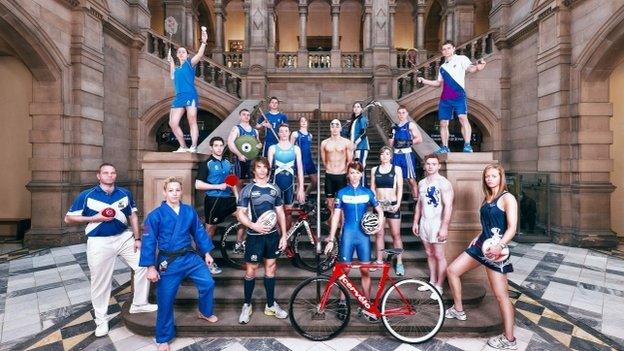
The Commonwealth Games in Glasgow begin in exactly one year. Is the city ready for this huge multi-sport event? But how ready is the city when it comes to venues, ticketing, security and transport?
VENUES
Most of the venues for Glasgow 2014 are ready for use.
The Emirates Arena and the Sir Chris Hoy Velodrome, built specially for the games, have been open since last year.
The Tollcross Swimming Centre and the Scotstoun sports centre have been upgraded.
The one major revamp still to take place is at Hampden, Scotland's national football stadium, which will host its last game in November before it undergoes a conversion into a track and field venue.
It has already had a £3m extension to the north stand and a further £14m of work will be carried out to raise the playing surface by 1.9 metres and create the space to fit in track and field facilities.
This means there will not be any football at Hampden for about a year. The Scottish Cup and League Cup semi-finals and finals will be moved to other venues in 2014, as will Scotland games.
Hampden, whose capacity will be reduced from 52,000 to 44,000 by the track and field work, will also stage the closing ceremony.
Glasgow's other major football stadiums will also be brought into action for the Commonwealth Games.
Ibrox, the home of Rangers football club, is the venue for the rugby sevens, while the opening ceremony for the 20th Commonwealth Games will be at Celtic Park on Wednesday 23 July.
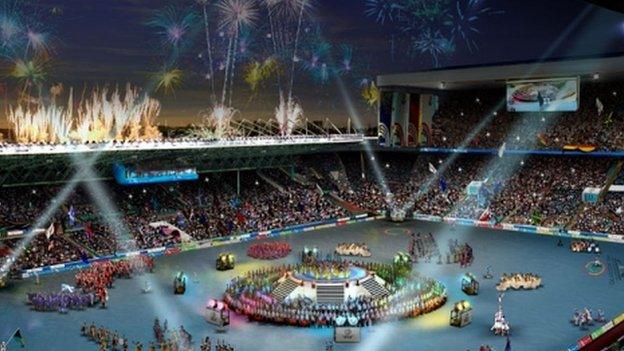
Artist's impression of the opening ceremony at Celtic Park
Over the following 11 days, 17 Commonwealth sports - ranging from athletics and gymnastics to lawn bowls and squash - will be contested at 13 venues around Glasgow and beyond.
The £113m Emirates Arena, which opened in October 2012 opposite Celtic's stadium in the city's east end, will host badminton events, as well as the track cycling at the velodrome.
Next door to the new arena is the athletes' village, which will house up to 6,500 athletes and officials in 700 homes and some flats. It is well on the way to completion and should be ready by the start of next year.
The village will be sold off for housing after the games.
Also in the east of the city are the recently-completed Glasgow Green Hockey Centre and the Tollcross International Swimming Centre.
Tollcross opened in May after a 19-month refurbishment costing £13.8m, with a revamped 10-lane 50m competition pool and a completely new six-lane 50m warm-up pool.
It has 2,000 permanent seats, and an extra 3,000 will be put in place during the games.
The venue will host all the swimming competitions except the diving, which will take place 45 miles away in Edinburgh.
The Royal Commonwealth Pool (RCP) in Edinburgh, which has previously hosted the 1970 and 1986 games, reopened to the public in March, following a two-year £37m refurbishment.
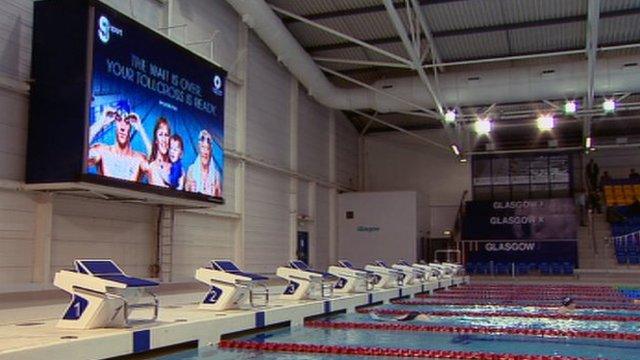
The Tollcross swimming centre has been revamped
The shooting competition will take place even further from Glasgow, 95 miles away at the Barry Buddon centre near Carnoustie in Angus.
On the far eastern outskirts of Glasgow, Strathclyde Country Park, near Hamilton, will host the triathlon, with the swimming part of the event taking place in the park's loch.
The mountain biking will be staged on a specially-built track, which has opened to the public, at Cathkin Braes, on the southern outskirts of the city.
Back in Glasgow, the SECC precinct, which includes the exhibition halls, the Clyde Auditorium and the newly-build 12,000-seat Hydro Arena, will host boxing, wrestling, judo, netball, gymnastics, weightlifting and power-lifting.
The Hydro Arena, which is scheduled to open in September as a major concert and entertainment venue, will stage the gymnastics and the final of the netball.
Squash and table tennis will take place at the Scotstoun sports complex, which will have 2,500 temporary seats for the games.
An all-glass centrepiece court, to be constructed on an adjoining piece of land, will be linked to the existing complex by a tunnel.
The temporary structure, complete with 2,000 seats, is to be taken down after the Games, but the west of Glasgow venue will be left with six new permanent courts.
And finally, the lawn bowls will be held in the shadow of Glasgow's famous Kelvingrove Art Gallery and Museum.
In April, the most recent visit by the Commonwealth Games Federation said they were "satisfied" with the progress made by Glasgow 2014.
The CGF said: "The next 14 months are a critical time, but we are confident the teams involved are up for the challenge."
TICKETING
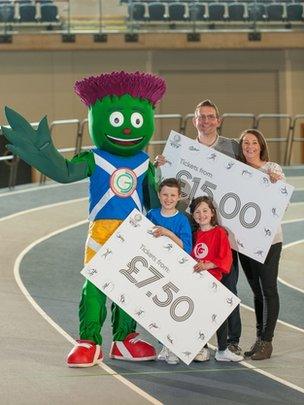
Games mascot Clyde publicises ticket prices with the McKenzie family
A ticketing guide, which includes an application form, will be available on 23 July.
This will give people time to work out what is on where and when before the first phase of ticket sales opens on 19 August.
Organisers said they had learned much from the criticisms of the ticketing arrangements for London 2012.
Like London, the sales will not be on a first-come, first-served basis.
Requests for tickets can be made until 16 September, when they will allocated through an "independent and computerised draw".
Organisers say you can apply on the first day or the last and you will still have a chance.
People will be either be successful or unsuccessful - they will not be offered a lower number of tickets than they applied for, or tickets for a different event.
Ticketing firm Ticketmaster will conduct all sales - online or by post - and, unlike London, it will accept a range of different payment methods.
The price of a ticket includes access to public transport in the local area on the day of each event.
Organisers have boasted that two-thirds of all tickets will be on sale for £25 or less.
Prices for the opening ceremony at Celtic Park start at £40, with the closing ceremony available from £30.
Tickets for the men's 100m final start at £15, rising to a top price of £90.
Glasgow 2014 said at least 70% of all tickets would be available to the public, with just 8% set aside for sponsors, who would also have to pay.
For athletics, there are six price categories, but for most other events there will only be two or three price bands.
SECURITY
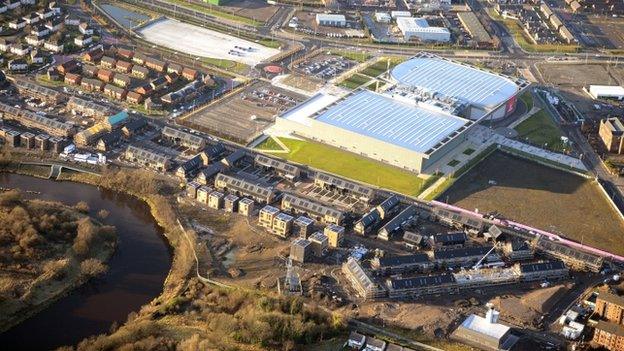
An aerial photo of the Emirates arena and the athletes' village
The security budget for the Glasgow 2014 Commonwealth Games was increased dramatically after the London Olympics.
The budget more than trebled to £90m, with the extra cash being spent on securing the athletes' village, hotels and training venues, and providing additional CCTV and perimeter fencing.
The athletes' village, which should be completed and handed over to the Games very early in the New Year, will be secured for six months before the event begins.
Some hotels and training venues will also get round-the clock security provision.
As a result of the problems experienced in London, where security firm G4S failed to recruit enough personnel and the army had to be drafted in to assist, contracts will be given to a number of firms, rather than just one supplier.
This should reduce the risk of one firm failing to deliver.
The chief constable of Police Scotland, Sir Stephen House, has agreed to take on responsibility for delivering security at the games - but he will have to make extensive use of private firms and has not ruled out the possibility that G4S could win one of the contracts.
TRANSPORT
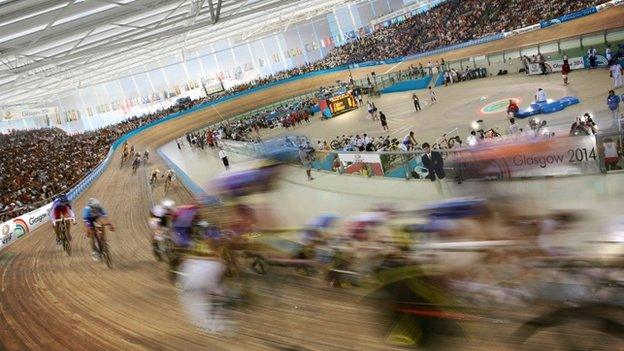
The Sir Chris Hoy velodrome opened in October last year
The 2014 Commonwealth Games will be car-free, with no parking anywhere near the venues, organisers have said.
All ticket-holders for Commonwealth Games events will be able to travel free on public transport and there is the promise of extra shuttle buses to help out at some venues.
Extra trains will run to stations near venues, such as Dalmarnock near the main east end sites, Exhibition Centre at the SECC, and Mount Florida for Hampden.
Drivers have been warned that parking restrictions will be extensive and widespread and security cordons will limit access to venues.
Organisers hope the fact that the games are taking place during the school summer holidays will mean there is more capacity on the city's transport network and that "distractions" such as arts events on routes to venues will encourage people to walk further than they normally would.
This is similar to the approach taken in London for last year's Olympics, although critics have said that Glasgow's public transport networks are not as comprehensive.
Organisers admitted there would be a certain amount of "education" involved in getting people used to the idea, but this would be backed up by early and clear information and park-and-ride options.
There will also be games lanes to ensure athletes can get to venues without being stuck in traffic.
These will involve further parking restrictions, right turns being banned and alterations to up to 220 sets of traffic lights to ease traffic flow.
VOLUNTEERS
Organisers were looking for 15,000 games-maker volunteers to help people find their way to venues and offer other assistance.
They were amazed to find that more than 50,000 people applied.
About 1,000 a week are being interviewed at the moment and those selected should be told by October.
OPENING AND CLOSING CEREMONIES
Who is Glasgow's Danny Boyle?
Responsibility for the opening and closing ceremonies has been given to events agency Jack Morton Worldwide.
Its track record includes the 2004 Olympics in Athens, the Fifa 2010 World Cup in South Africa and some of the celebrations for last year's Royal Wedding.
The US-based company has been given a budget of £14m for the ceremonies, but details of what they will involve is being kept under wraps for now.
David Zolkwer, director of public events for Jack Morton Worldwide, is the head of ceremonies for the Glasgow 2014 Games.
The ceremonies include the Parade of Nations, during which countries are welcomed to the Games, and the arrival of thousands of athletes.
It will also feature the end of the Queen's Baton Relay, which will visit every one of the 70 Commonwealth nations and territories before travelling throughout Scotland for the Games.
The handing over of the flag to the Gold Coast, host of the 2018 Commonwealth Games, will be a highlight of the closing ceremony.
- Published23 July 2013
- Published23 July 2013